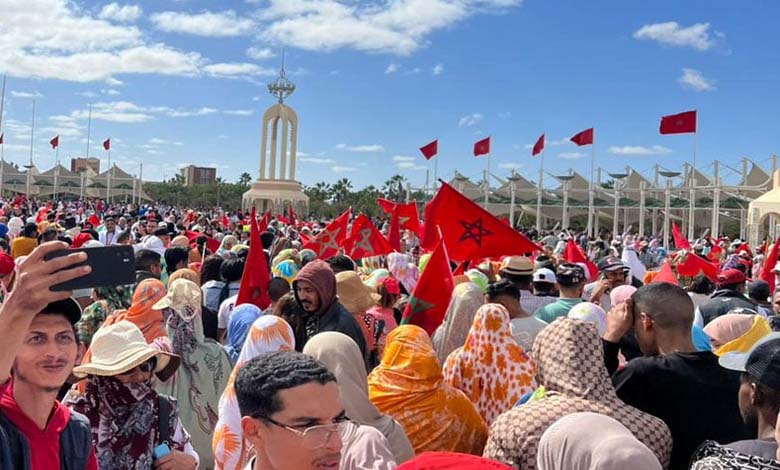Laayoune rise in protest against the Polisario attacks and demand their classification as a terrorist organization

Moroccan Sahrawi tribal leaders in Laayoune affirm that Morocco, its territories, and the safety of its citizens are a red line, declaring their support for the Moroccan monarch.
The city of Laayoune, one of the major cities in the Moroccan Sahara, witnessed a massive march and angry protests on Sunday, in rejection of the terrorist attack that occurred in the city of Smara, leading to the death of one person and the injury of two others with serious injuries and the destruction of four residential houses. They demand the international community to classify the Polisario Front as a terrorist organization.
The voices of thousands of Sahrawis condemning the Polisario’s terrorism against the people of the Sahara who insist on Morocco’s territorial integrity echoed, and the protesters carried Moroccan flags, images of King Mohammed VI, and banners condemning the missile strikes on residential areas.
The city of Smara experienced two explosions early on Sunday in separate areas, one of them near the “El Rabib” camp, while the second explosion occurred near a military barracks belonging to the Royal Armed Forces, where the MINURSO mission headquarters is located in the city. This terrorist attack comes about a week after an attack claimed by the separatist Polisario Front that resulted in the death of a civilian and the injury of others.
— morrocco4life🇲🇦adam (@morrocco79) November 5, 2023
Moulay Hamdi Ould Rachid, the President of the Municipal Council of Laayoune, expressed widespread popular condemnation of this heinous attack that targeted innocent civilians in residential neighborhoods of the spiritual and scientific capital of the southern regions of the kingdom.
Around 100,000 citizens participated in massive demonstrations that marched through the streets, starting from the gathering in Umm Al-Saad Square in the city, reaching the Meshwar Square, with the presence of representatives from various political factions, Sahrawi tribal leaders, and the participation of local civil and economic organizations.
Social media activists joined in condemning this crime, and the hashtag #MoroccanSahara received significant interaction from Moroccans across the country, with comments such as, “The Moroccan Sahara is a red line.”
🔴🇲🇦🇲🇦|| “الصحراء مغربية والجبهة إرهابية”
هكذا يهتف الصحراويون الآن في وقفة حاشدة من قلب السمارة بالصحراء المغربية 🇲🇦🇲🇦🇲🇦 pic.twitter.com/boxei6QDXN
— Tarek Elkassmi – (بوغطاط المغربي) (@TarekElkassmi) November 5, 2023
Sahrawi tribal leaders in the Laayoune-Sakia El Hamra region issued a statement condemning the “heinous and serious attack suffered by the city of Smara.” The statement declared, “We, the tribal leaders in the Laayoune-Sakia El Hamra region, announce to the international and United Nations community our strong condemnation and denunciation of this cowardly attack.”
The statement argued that “the attack is inconsistent with international charters and norms, as it targeted innocent civilians in a populated non-military area,” and the signatory tribal leaders considered the attack as a desperate attempt “by the opponents of the territorial unity of the Kingdom of Morocco to undermine and disrupt the international, regional, and national efforts supporting the unity of Morocco on its territories.”
تحية لناس العيون وكل الصحراء المغربية 🫡 🇲🇦 أين هم اصحاب الگضية من هذه المظاهرات ؟ pic.twitter.com/nbxLNeOHi0
— nina (@NadineRiri289) November 5, 2023
The statement also affirmed that “Morocco and its territories and the safety of its citizens are a red line,” and they declared their support for King Mohammed VI and praised all the wise and prudent steps taken to defend territorial unity and to take all legal actions against the entity responsible for this heinous terrorist act.
Abdellatif Bera, one of the Sahrawi tribal leaders, stated, “The brutal act that affected civilians in Smara is considered a terrorist and cowardly act, confirming the practical failure of the Polisario’s argument that threatens the security and stability of our dear region for all Moroccans.”
Bera pointed out that “the solidarity march in which Sahrawi tribal leaders, elected officials, and citizens are participating is an invitation to the international community to stand with the Kingdom of Morocco and condemn the Polisario Front, which has crossed internationally condemned terrorist ideologies.”
Observers believe that the situation has not changed since the Guerguerat crisis of 2020, which marked the beginning of the escalation by the Polisario Front after it announced its disavowal of the ceasefire agreement signed with the United Nations in 1991, supported by Algeria, which does not want the tension to ease.
Mustafa Salma Ould Sidi Mouloud, a former security official in the Polisario Front, stated that “the Guerguerat crisis ended on November 13, 2020, with Morocco securing the region and extending its defensive perimeter to the borders with Mauritania, thereby achieving a permanent flow of people and goods through the crossing, and connecting its sovereignty boundaries with Africa for the first time since the colonial era”.
He added that “this Moroccan step deprived the Polisario and its Algerian backers of the most important card, which they had hoped would isolate Morocco geographically from Africa. There was no way for the Front to continue its presence in the conflict, even at the minimum, without resorting to the worst option, which is the declaration of disavowal of the ceasefire agreement and a return to war.”












